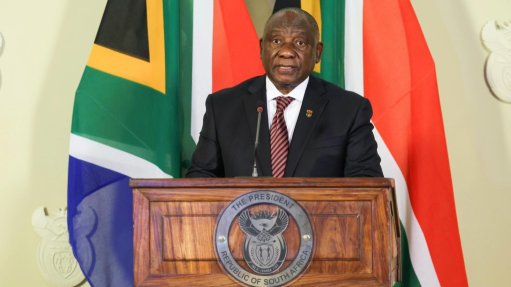Bling over basics
Imagine a country rolling out the red carpet for foreign guests while its citizens grapple with severe food shortages. In Zimbabwe, this contradiction is illustrated by the decision to spend $200-million on lavish villas with high-end amenities for delegates attending the Southern African Development Community (SADC) heads of State and government summit on August 17. This comes despite a desperate appeal to donors amid a debilitating drought that has left just under two-thirds of the population food insecure.
What’s more, roads to the summit venue – Zimbabwe’s new Parliament building, located about 25 km from Harare – have received a facelift, with brand-new asphalt and streetlights. The revamped roads stand in stark contrast to the chaotic streets of the capital city, where vendors operate in squalid conditions and motorists navigate treacherous potholes.
That Zimbabwe’s government chose to incur this huge expenditure merely to impress delegates to the summit, where President Emmerson Mnangagwa will assume the rotational chair of the regional body, is deeply unconscionable. The nation has appealed to the international community for billions of dollars to mitigate hunger partly caused by an El Ninõ-induced drought during the 2023/24 agricultural season. It’s estimated about nine-million Zimbabweans, or 60% of the population, could be affected by the impending food shortages.
In April, when he declared a nationwide state of disaster, Mnangagwa stated that the country expected to harvest 868 000 t of grain during the 2023/24 season – far short of expectations and about 680 000 t less than the country’s requirements. Preliminary assessments have indicated that the country needs more than $2-billion to avert a catastrophe.
Mnangagwa’s priorities seem straight out of a tragic farce. It’s as if he believes rolling out the red carpet for foreign guests will somehow distract from the empty bowls at home.
But he is not the only African leader who has splurged on hosting an international event at huge expense. Cote d’Ivoire’s Alassane Ouattara comes to mind. In January this year, his country played host to the thirty- fourth iteration of the Africa Cup of Nations (Afcon) tournament, an undertaking that set the fiscus back $1-billion – in a country where more than half the population lives on $1.25 or less a day.
The difference between Mnangagwa and Ouattara is that, while the former splurged $200-million on infrastructure to dazzle his regional peers, the latter had his sights on charming Ivorians when he bid for Africa’s biggest football spectacle to come to his backyard. The 82-year-old controversially contested for a third term in 2020 and Ivorians are wondering if he will run again in elections due next year.
Ouattara’s critics argue that Cote d’Ivoire’s hosting of Afcon was a ‘sportswashing’ ploy by the elderly President. For those who missed the memo, sportswashing refers to the use of sports to help launder the image of controversial leaders or policies. The idea is that in countries with a deep passion for sports – especially football – citizens tolerate or appreciate leaders who bring major tournaments, such as Afcon, to their country. Thus, detractors might argue that the real motive behind bringing the spectacle to Cote dʼIvoiore was to distract from the controversy around the President’s extended hold on power.
The short-term economic benefits of hosting sporting events of the magnitude of Afcon are well established, with Romeo Boye of the Centre for Economic and Social Research in Abidjan, the Ivorian capital, noting in January that “the four-week period will have a positive impact on GDP this year”.
However, many economists are unconvinced that the benefits will offset the cost – even in the long term. There could be negative short-term consequences too. An academic from Abidjan noted that the authorities had ruined the subsistence economy by closing street stalls during the tournament, citing health and safety reasons.
Just as Zimbabwe faced criticism over its spending on hosting the SADC summit, Cote d’Ivoire’s $1-billion splurge on Afcon 2024 has also been heavily criticised, with many questioning Ouattara’s priorities, given his country’s poverty levels. It seems our leaders are prepared to prioritise bling over basics.
Article Enquiry
Email Article
Save Article
Feedback
To advertise email advertising@creamermedia.co.za or click here
Announcements
What's On
Subscribe to improve your user experience...
Option 1 (equivalent of R125 a month):
Receive a weekly copy of Creamer Media's Engineering News & Mining Weekly magazine
(print copy for those in South Africa and e-magazine for those outside of South Africa)
Receive daily email newsletters
Access to full search results
Access archive of magazine back copies
Access to Projects in Progress
Access to ONE Research Report of your choice in PDF format
Option 2 (equivalent of R375 a month):
All benefits from Option 1
PLUS
Access to Creamer Media's Research Channel Africa for ALL Research Reports, in PDF format, on various industrial and mining sectors
including Electricity; Water; Energy Transition; Hydrogen; Roads, Rail and Ports; Coal; Gold; Platinum; Battery Metals; etc.
Already a subscriber?
Forgotten your password?
Receive weekly copy of Creamer Media's Engineering News & Mining Weekly magazine (print copy for those in South Africa and e-magazine for those outside of South Africa)
➕
Recieve daily email newsletters
➕
Access to full search results
➕
Access archive of magazine back copies
➕
Access to Projects in Progress
➕
Access to ONE Research Report of your choice in PDF format
RESEARCH CHANNEL AFRICA
R4500 (equivalent of R375 a month)
SUBSCRIBEAll benefits from Option 1
➕
Access to Creamer Media's Research Channel Africa for ALL Research Reports on various industrial and mining sectors, in PDF format, including on:
Electricity
➕
Water
➕
Energy Transition
➕
Hydrogen
➕
Roads, Rail and Ports
➕
Coal
➕
Gold
➕
Platinum
➕
Battery Metals
➕
etc.
Receive all benefits from Option 1 or Option 2 delivered to numerous people at your company
➕
Multiple User names and Passwords for simultaneous log-ins
➕
Intranet integration access to all in your organisation

















